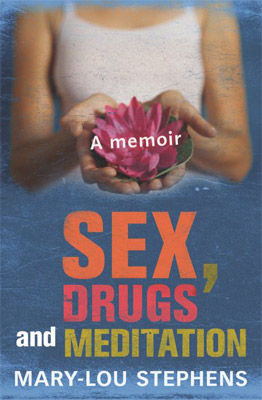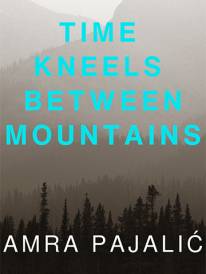Sex, Drugs and Meditation

Sex, Drugs and Meditation
Wickedly humorous and beautifully told, Sex, Drugs and Meditation is Eat Pray Love meets Judith Lucy.
It is the true story of a woman with a talent for self-sabotage who learns to sit still, shut up and start living – and loving.
Miraculously, Mary-Lou Stephens has just made it into her forties. With the aid of therapy and NA/AA she has overcome a tricky childhood (youngest of six kids, evangelical parents); drama school; drug and alcohol addiction; the lure of performing in late night gigs; and her spectacularly poor taste in men. She has landed a dream job as a broadcaster for the ABC. Life is looking good. Except that Mary-Lou has a new boss, a psychopath in a suit.
Determined to avoid MORE therapy, and desperate to cope with an increasingly toxic work environment, Mary-Lou signs up for a ten-day meditation retreat that requires total silence, endless hours of sitting cross-legged, and a food-as-fuel kind of a diet (i.e. basic). For a woman who talks for a living, is rarely still and cooks for comfort, this was never going to be an easy ask.
Mary-Lou Stephen was born and raised in Tasmania. She studied acting at The Victorian College of the Arts and played in bands in Melbourne and Sydney before she got a proper job – in radio. Mary-Lou kicked off her radio career at 2TM in Tamworth. She was lured away to help start up a brand new station in Townsville where she was the Breakfast co-host, Music Director, Assistant Program Director and very tired a lot of the time. Since joining the team at ABC Coast FM Mary-Lou has been the Music Director as well as presenting every shift ever invented including, Drive, Afternoons and Evenings.
Sex, Drugs and Meditation
Macmillian Australia
Author: Mary-Lou Stephens
ISBN: 9781742610177
RRP: $32.99
Interview with Mary-Lou Stephens
Question: Why did you decide to write a memoir?
Mary-Lou Stephens: I have been writing a poem and short stories for a while. I used to read self-help books and found myself drawn to the little case studies with stories about how people came to their lives and I often would just read the case studies (laughs) because I liked the stories.
I had a complete realisation of how I've been making myself miserable for so long and because my story had a happy ending, I thought it was like a big case study! I decided to write it and see if anyone else wanted to read about how I transformed my life and apparently they do…
Question: Was it difficult to relive some of the experiences discussed in the book, Sex, Drugs and Meditation?
Mary-Lou Stephens: Some of them very much so, especially to come out and write that I used to take heroin was really tricky as it was always a big black secret because it's not the kind of thing you drop into everyday conversation. It was a lovely gift to be able to talk about how my mind, (and most people's minds) work and how they get us trapped in these ways of thinking that make us unhappy and how we can move away from that.
What I did find interesting when I was doing the edit and going through the book with a fine toothcomb was that I had realisations that I hadn't had when I first had written it and things started to click into place. I was howling with tears at one point and the dog was howling with me (laughing) and I was saying -that's why that happened' and -that's why this happened that way'. The book is like one of those Russian dolls with the doll within the doll within the doll; I found more and more the deeper I got.
Question: Would you recommend the ten day silent retreat to others?
Mary-Lou Stephens: Absolutely! In the book I describe the first one I ever did and I could not understand why people would ever do it again, it was excruciating at times and incredibly physically painful but I am a fan of them now and I get something different from each one. Mediation is a practice and I just keep practicing, I'm not perfect at it and my mind still wanders away but it's okay, I know how to make my mind come back to the meditation. The ten day silent mediation retreat is tough I call them Mediation Boot Camp and you do have to have a certain amount of resilience to be able to complete one; it's not for people with severe psychological disorders.
There was a point in the ten day silent retreat where I became extremely paranoid because no one is talking to you and no one is even looking at you, you are meant to be mediating as if you're on your own. I started to think everyone hated me which is another pattern my mind goes into normally, as I have suffered from paranoia in the past. I was at a stage of mediation where I could observe the way my mind was going and how it was working and I had to tell myself that people didn't hate me and they did wish I would leave the mediation retreat. We pick up so many clues about how people feel about us from how they relate to us and all of that was gone so when no one was talking or looking at me my mind immediately went to -they hate me' (laughs) which is a revelation in itself.
Question: Why was it important to write the memoir with a touch of humour?
Mary-Lou Stephens: I keep getting told it's a brave and honest book and I don't want to seem self-indulgent. When the book came out in the book format I decided to read it, as if it was a book and I was going to interview the author. Occasionally I would think -she's getting a bit self-indulgent here' and then the book would go off on a completely different tangent and I'd think -ooh I'm interested again, now'. Humour helps break that up however I didn't intend it to be as funny, as it is (laughs). I don't think of myself as a funny person, I know people who are funnier and crack me up and I am not one of them. I think it's the humour of recognition as people recognise the stuff they do themselves in the book and that's what makes it funny!
Question: What would you tell your teenage self, if you could?
Mary-Lou Stephens: -Relax! Relax, it is okay!'
As a teenager I was unhappy, confused and I felt totally alone and food was my only friend, I turned to food at a very young age. I really did think food was the only thing that I could get any form of love from and I would tell myself -that is not true, food is not something that gives you love, food helps you feel better for a little while but it's not going to work long term'. I kept buying food, stealing food and stealing money to buy food because I thought it was the answer. I'd tell myself -it's not going to work, it's not your friend and it's going to be okay so relax and breathe'. Although really, what teenager wants to relax and breath?
When I was a teenager I did find moments of happiness when I was acting in the school play and singing in the school choir and I really would like to tell myself to have done more of that!
Question: What do you hope readers take away from Sex, Drugs and Meditation?
Mary-Lou Stephens: That we don't have to keep creating our own misery and that through the way that we think, we often create our own misery and through mediation we can move through that and how to be happy. We can observe our pattern and the way we act to things and come out of that learning a different way of being with all different types of possibilities –it can be a happy, joyous world!
MORE



